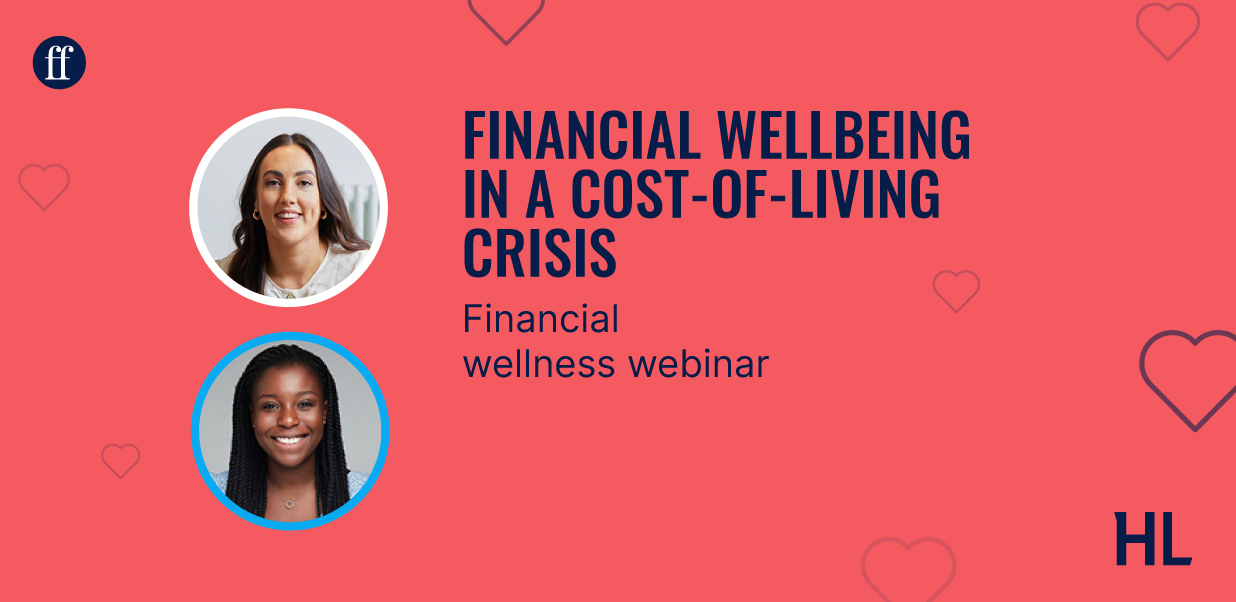Navigating financial wellbeing in a cost-of-living crisis
A recap on our financial wellbeing webinar plus we answer your burning questions.

Last Updated: 1 January 2003
In this article and webinar, we explore financial wellbeing in a cost-of-living crisis, but this isn’t personal advice. If you’re not sure if a course of action is right for you, ask for financial advice.
Almost 9 out of 10 UK adults have faced rising living costs. And it’s having a significant impact, with a quarter of people now spending more than they earn and at risk of running up debt.
I ran a webinar with Ola Majekodunmi from All Things Money looking at ways to make your money go further, including:
- The power of a budget
- How to cut costs
- Why you should say yes to a YES fund
- Financial self-care
- And how to give your pension some attention
As with all Fearless events, there were lots of great questions. Here are the ones we didn’t get chance to answer.
Webinar Q&A
Q: What is an example of a budget plan?
A: Budgeting is knowing where your money is going, not wondering where it has gone.
It’s splitting your income into chunks. You can then see what you spend your money on, prioritise and hopefully have some left over to enjoy:
- Essential you – Rent, bills, food and debt repayments
- Future you – Savings and pension
- Fun you – Luxuries, hobbies and holidays
There’s not a one-size-fits-all budget plan. Yours will depend on your goals and lifestyle. You can use our budget calculator to give you a head start.
Q: What happens when you have nothing left after your budget?
A: Selling unwanted clothes or tech on resale sites is a great way to give you a small one-off financial boost.
There are also cashback websites or survey and market research sites which want your feedback in exchange for some passive income.
But a more realistic longer-term fix is looking at how you can earn more. Unfortunately, only two in five women negotiate pay rises. If you think you’re worth more, why not:
- Research and benchmark your salary against similar roles
- Know your value and write down why you’re worth a higher salary
- Plan how you’ll bring this up with your manager
This will give you confidence to ask. And if they say no, then it might be time to consider looking for a new job.
Q: I sold my flat last year and I’m not planning to buy for a while. What should I do with this money?
A: This is money you don’t want to waste. So, if you plan on buying in the next five years, put your money into a fixed, high-yield savings account, until you start looking again.
HL’s Active Savings can give you access to fixed-term savings products from different banks and building societies, with one online account. You could get better rates and more choice than a typical high street bank.
Just remember you can’t usually withdraw your money with a fixed product until your term has ended.
Learn more about Active Savings
Q: I don't know how to invest my money. Does HL have designated professionals that can help in doing this?
A: Investing for the first time is easier than you might think. There’s lots of helpful information on our website to help you get started and guide you through the process.
Our Helpdesk is also there to answer any questions you may have. They can talk you though the different investment options or the types of account we offer but they do not provide individual financial advice.
You can also look at Financial Advice service if you would prefer an expert to build an investment portfolio for your goals. It costs a min £495 over the telephone and £1,495 face to face (plus VAT where applicable).
Find out about our financial advice service
Q: I tend to buy when stressed, do you have any recommendations to mitigate that trigger?
Shopping can boost our mood, whether treating ourselves or someone else. You can get that same dopamine hit by going for a walk, hitting the gym, cooking or reading a book.
But there are also little tips to stop impulse spending from damaging your long-term savings goals, for example:
- Keep your savings and current account separate, so you don’t spend money that’s put away for a rainy day.
- Set up direct debits close to pay day to pay bills and move money into your savings.
- Unsubscribe from sales emails, turn off notifications on shopping apps and unfollow brands on social media. 37% of impulse buys are done in bed and this will help remove some temptation.
Join the Financially Fearless mailing list
Financially Fearless is the first step in empowering women to improve their financial health and wealth. Take your first step today and sign up for weekly emails packed full of expert content using the form below. Or if you’re on Instagram follow us @FinanciallyFearless_hl.
Please correct the following errors before you continue:
Hargreaves Lansdown PLC group companies will usually send you further information by post and/or email about our products and services. If you would prefer not to receive this, please do let us know. We will not sell or trade your personal data.
This website is issued by Hargreaves Lansdown Asset Management Limited (company number 1896481), which is authorised and regulated by the Financial Conduct Authority with firm reference 115248.
The Active Savings service is provided by Hargreaves Lansdown Savings Limited (company number 8355960). Hargreaves Lansdown Savings Limited is authorised and regulated by the Financial Conduct Authority (firm reference number 915119). Hargreaves Lansdown Savings Limited is authorised by the Financial Conduct Authority under the Electronic Money Regulations 2011 with firm reference 901007 for the issuing of electronic money.
Hargreaves Lansdown Asset Management Limited and Hargreaves Lansdown Savings Limited are subsidiaries of Hargreaves Lansdown plc (company number 2122142).



